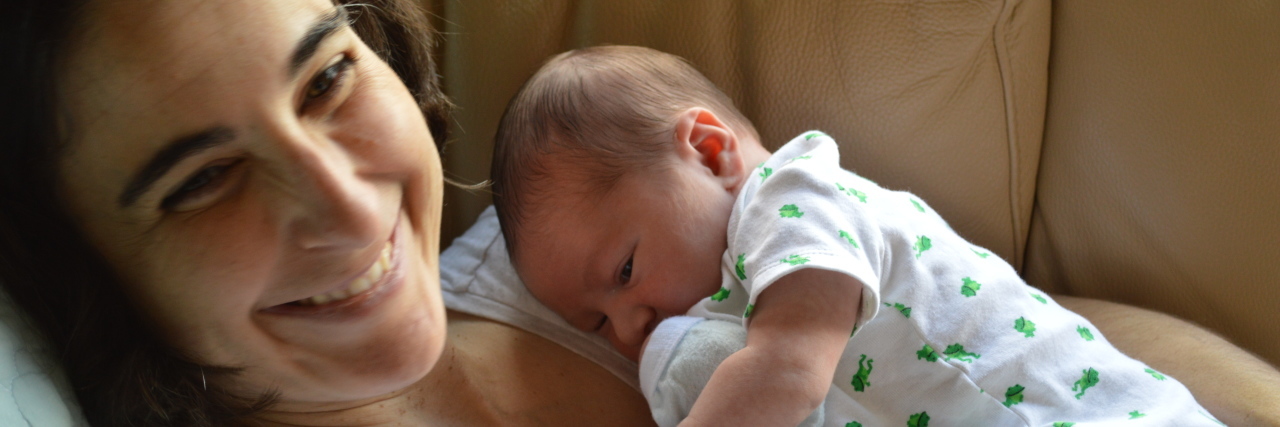I look with trepidation at the white plastic stick in my hand, holding it gingerly by its ergonomically designed handle. A pink line had formed to match the existing one in the small window in the center of the stick. Two pink lines. Oh shit.
What is Parkinson’s Disease?
A few days later, sitting in the familiar rose-colored vinyl chair in her office, my doctor informs me that there is no need to verify the results with further testing. She calculated a due date: July 15, 2015 and gave me a requisition for a six-week ultrasound. This pregnancy had been very carefully contemplated and planned. But I was still terrified. I had taken a giant step into the unknown and there was no going back.
Despite having juvenile Parkinson’s disease, I felt very strongly that having a child was part of my life journey. I did my research, finding what information I could on the internet and consulted with several doctors — my family doctor, my neurologist, and a specialty clinic for women with medical disorders. The combination of pregnancy and Parkinson’s disease is rare because of the rarity of Parkinson’s disease in women of childbearing age. I was satisfied from the literature available at the time that neither my Parkinson’s disease nor the drug I rely on posed an increased risk of problems for the baby.
We were also able to access genetic testing and found out that my husband did not carry the matching recessive PARKN gene that could create a susceptibility to Parkinson’s disease in our offspring. I was comfortable with the risk that my PD symptoms might get worse. I figured they were going to get worse anyway. I might as well live my life.
I had a relatively easy pregnancy. My obstetrician told me that except for the fact that I had Parkinson’s disease, my pregnancy was normal and healthy. I was glad that the last 20 years I had spent learning to take care of my body had paid off. Because of my chronic illness, I eat well, practice yoga and meditation, exercise regularly and manage my stress.
I was not sure how I was going to manage motherhood while also dealing with the fluctuations in my physical symptoms. My husband was fully committed to the reality that he would have to take on more of the work and my parents moved to live closer to us to help. We also prepared for the fact that we may need to hire a full-time nanny, even during my maternity leave.
On July 18, in the wee hours of the morning, a squirming, warm and fragile little being was placed onto my chest and my heart immediately expanded. Because of my fears, I had not anticipated feeling connected to the baby. However, I instantly felt immense love for this new person. I clutched him and whispered into his ear that I would do my very best to take care of him.
He is now just over 2 years old. I am doing my very best to take care of him. I have needed help. I have felt disappointed in myself. I have become frustrated. I have struggled. I have lost my patience. I have cried. I have felt guilty for all the help that I have. On the mornings when I wake up with my body shaking with tremors or frozen in spasms I sometimes think, “I just can’t do it today.” But I get up. I am trying to get better at taking care of myself too. I am so grateful for the love he has brought into our lives and the continuous expansion he demands of me.
Here are my thoughts about making the first three months easier:
- Put everything else on hold.
- Make a sleep schedule so each parent can get five hours uninterrupted sleep per night (this will only work if you are unable to or choose not to breastfeed).
- Sleep when the baby sleeps! (seriously — put Facebook down).
- Don’t expect to go out very much — give yourself a break from social obligations and have a little retreat with your baby and your family. Don’t stress about getting out unless you need to for your own sake. The baby really doesn’t care. There is enough stimulation in your house and around your block for the baby. You really don’t have to go to Baby and Me classes just yet.
- Keep to a loose schedule for feedings and establish a bedtime/naptime and wake-up routine from day one. Keep a clear distinction between day and night.
- Let things go, but try to stay on top of the laundry and the dishes.
- Get help — I found the best help was with background things like cleaning, dishes and laundry. Hire a housekeeper or arrange for such help with your family in advance, if you can. But just accept that everyone wants to “help” by holding the baby.
- Keep your nursery simple and organized. Have diaper changing stations in several rooms of the house so you don’t have to walk to the nursery each time to change.
- Freeze meals in individual servings before the birth to last at least two weeks. Ask people to bring food instead of a cute onesie.
- Have some sort of rejuvenating and centering practice for yourself- prayer, meditation, guided relaxation, etc.
Follow this journey on A Slower Kind of Life.

